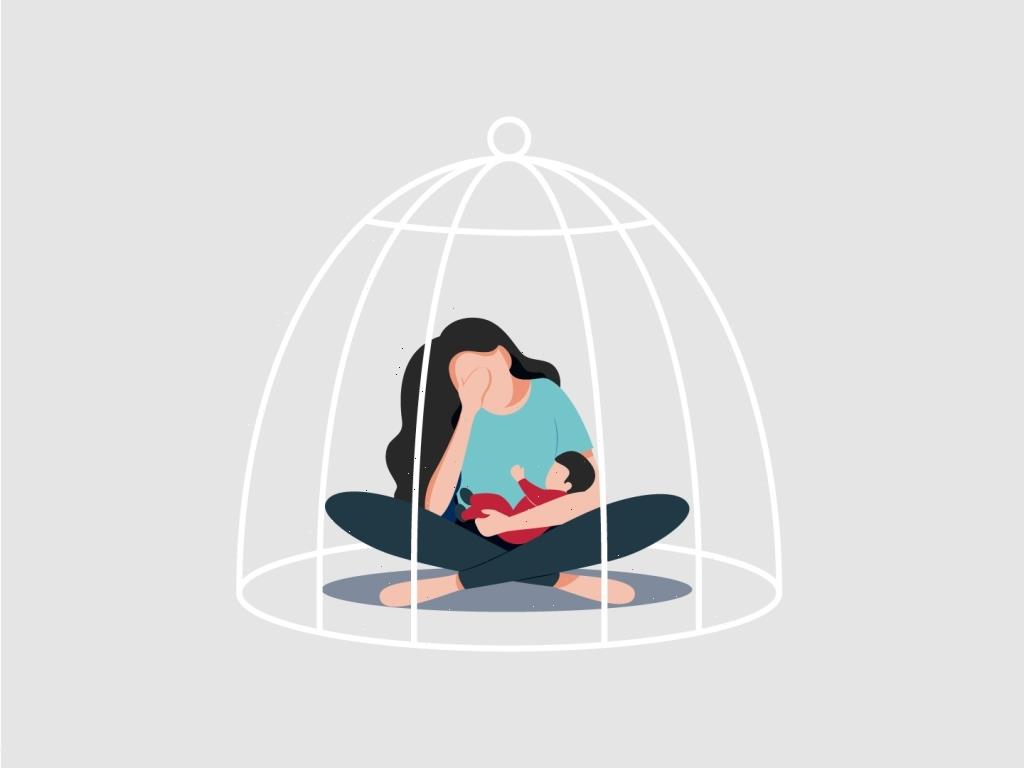No matter how your baby comes into this world, giving birth is a life, mind, and body-changing experience. Even with nine months to get ready, the act of giving birth is hard to truly wrap our minds around. Once the baby is delivered, a new mother’s hormones can cause her to experience the “baby blues,” making her feel stressed, sad, anxious, lonely, tired, or weepy. But some women, up to 1 in 7, can experience a much more serious mood disorder called postpartum depression. It is important to note that experiencing postpartum depression does not make a new mom weak and recognizing the signs so that it can be treated will make those first few months of motherhood safer and more manageable for mom and baby.
Postpartum depression falls under the perinatal mood and anxiety disorders (PMADS) umbrella, which also includes postpartum anxiety, postpartum OCD, and postpartum psychosis. While signs and symptoms may present themselves differently depending on the person, Paige Bellenbaum, LMSW, and Founding Director of The Motherhood Center in New York says that while it’s helpful for women and birthing people to recognize when they should seek help, it’s equally as crucial for partners and healthcare professionals to recognize it too.
“When you’re in that place you have little to no agency to recognize what’s going on with you, let alone be in the right headspace to pick up the phone and look for a clinician or a mental health service provider,” Paige says. “So I cannot stress enough how important it is for partners to know all the signs because when their wife or girlfriend is struggling, they need to be able to pick up the phone and make the call.” But as Paige says, “education equals prevention,” so in order for someone to make the call, whether it’s a partner or patient, they need to be able to spot the signs of struggling with mental health after birth. Read below for some of the symptoms associated with PMADS.
You feel hopeless
If you start to experience feelings of hopelessness or helplessness, then that may be a sign to contact a healthcare professional. This is characterized as having a lack of optimism and passion, with no expectation of improvement. It can be a debilitating feeling, especially when you account for the feeling of responsibility you now have toward this child who you will now be taking care of for the next 18 years or so. If you find that in addition to hopelessness, you are also sad, crying frequently, irritable or even rageful (and these feelings show no signs of stopping), you or a partner may want to consider taking steps to get proper support.
You aren’t connecting with your baby
When new moms who are anxious and/or depressed suffer from mother-infant bonding impairment. According to the Help Guide, attachment or the attachment bond is the unique emotional relationship between your baby and you, their primary caretaker. Sometimes when this attachment doesn’t develop, new moms can end up feeling guilty, which can cause them to step away entirely or more fully immerse themselves into being a new parent. This only further exacerbates the issues as putting more of yourself into something when you’re already running on empty, can leave you feeling even more overwhelmed and burnt out.
You’re catastrophizing
“When it comes to anxiety, I like to equate it to the mind being like a hamster wheel,” Paige says. “It keeps racing and racing and spinning and spinning and no matter how hard you try, you can’t turn it off. We call this catastrophizing.” This is further characterized as jumping to conclusions and thinking of the worst possible case scenario. “It’s all or nothing, black and white thinking, Paige adds. “It’s this feeling like there’s this impending sense of doom and something awful is about to happen and typically something awful to the baby.”
It’s tough making decisions
According to The Motherhood Center, it’s not uncommon for first-time mothers to experience some level of anxiety. However, when that anxiety becomes debilitating, making it much more difficult to make any decision, you should talk to a healthcare professional. For example, when it comes to having to decide on something relating to your baby’s care i.e. feeding, sleeping, sickness, a sense of fear (mostly, of doing something wrong) can take hold. And when it’s on top of everything else, it can be extremely difficult to care for yourself.
Things that brought you joy don’t anymore
As a new mom, it’s totally understandable that you may be busy (after all, taking care of a newborn is no easy feat). If you find that you don’t have as much time to do the things you once did for fun, that’s okay. But it’s important to remember that outside of motherhood, it’s always good to have hobbies and activities you enjoy doing i.e. writing, painting, or running. But when those activities no longer bring happiness, it could be a sign that your mental health is taking a turn, according to Paige.
Appetite changes have occurred
In 2019, Chrissy Teigen spoke out about how her loss of appetite was an early indicator that she had postpartum depression, but while appetite loss could be a sign to talk to your doctor about your postpartum mental health, eating more than normal could be a sign as well. If you find that your diet has drastically changed after giving birth and for an extended period of time, talk to a doctor to ensure you’re doing what you can to keep your baby and yourself healthy.
Source: Read Full Article
